You can now add Healthify as a preferred source on Google. Click here to see us when you search Google.
Reducing your risk of dementia
Key points about reducing your risk of dementia
- Your chance of getting dementia depends on some things you can’t change such as getting older and the genes you inherit from your parents.
- However, there are things you can change which make dementia less likely.
- The key things to do are to look after your brain health, be physically active, challenge your brain and connect with other people.

Dementia is a group of symptoms caused by an ongoing decline in your brain function. Symptoms include problems with memory, thinking, language and understanding, mood and behaviour. As these symptoms get worse, they can make it difficult for you to do your normal daily activities.
The most common type of dementia is Alzheimer's disease. Other types include vascular dementia, Lewy Body dementia, and dementia that’s associated with degenerative neurological conditions such as Parkinson’s disease.
While dementia is most often diagnosed later in life, your brain usually starts to develop changes years earlier.
Some dementia risk factors are difficult or impossible to change, such as aging and genes. But there are lifestyle factors that affect risk and by changing these you could reduce your risk of dementia. Researchers think that up to 45% of dementia could be prevented or delayed by changing these risks.
Video: What is a risk factor for dementia?
The causes of dementia are complex, and there is still a lot to learn about the risk factors – the things that increase your chances of developing a medical problem. For most people, it's likely that your age, genes, medical history and lifestyle all play a part in your risk of developing dementia.
Some risk factors can’t be changed. These include:
- Age – the older you are, the more likely you are to develop dementia. But dementia isn’t a normal part of aging.
- Genes – although genetic factors affect some more unusual forms of dementia, such as early-onset Alzheimer’s disease and frontotemporal dementia, it mostly develops as a combination of genetic and lifestyle factors.
Other risks can be changed, by our governments, our communities or ourselves, such as:
- education level
- air pollution
- traumatic brain Injury
- smoking
- obesity
- diabetes
- high blood pressure
- high LDL (low density lipoprotein) cholesterol
- physical inactivity
- depression
- hearing loss
- vision loss
- too much alcohol
- loneliness or social isolation.
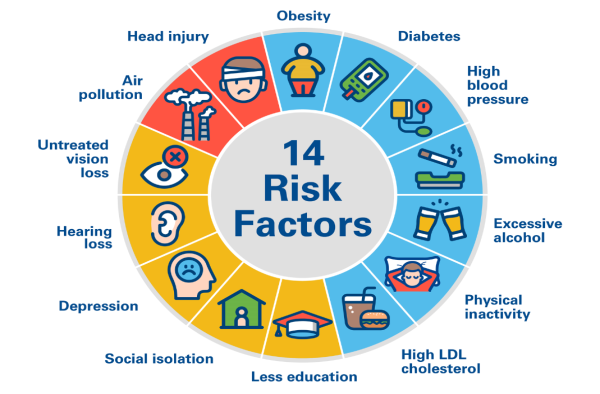
Image credit: Alzheimers NZ
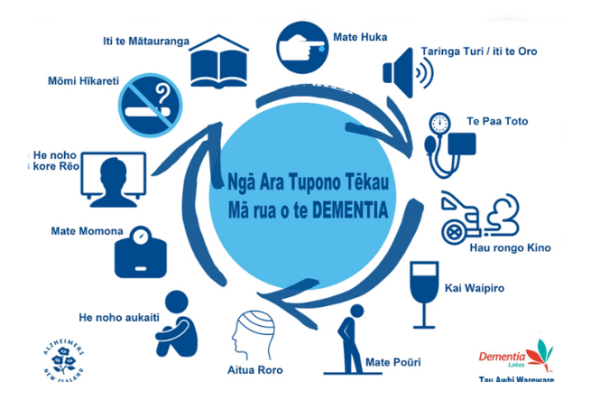
Image credit: Alzheimers NZ
Recent research has added 2 more risk factors for dementia to the 12 in the image above. The 2 new ones are high LDL cholesterol and vision loss. It's suggested that almost half of dementia worldwide could be prevented or delayed if these risk factors were addressed.
Māori and Pacific Peoples may get dementia up to 10 years younger than New Zealand Europeans, possibly because they have higher rates of risks such as diabetes and high blood pressure.
Generally, what’s good for your heart is also good for your brain.
Risk factors for cardiovascular disease, such as heart attacks and stroke, are also risk factors for dementia. Living a healthy lifestyle helps lower your risk of cardiovascular diseases and is likely to lower your risk of dementia too.
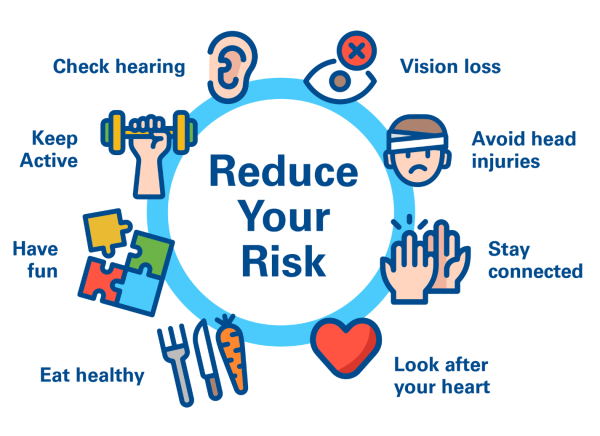
Image credit: Alzheimers New Zealand (with permission)
Healthy lifestyle choices for a healthy brain
1. Quit smoking, or don't start
Smoking increases your risk of dementia.
2. Limit your alcohol
Heavy drinking (about 3 or more standard drinks a day) increases your risk of dementia, and so does blacking out from alcohol. There are other good reasons to drink less than that too. Read more about harmful drinking.
3. Be physically active most days
Exercise at any age directly reduces risk of dementia in the future. It also indirectly helps by improving blood pressure and reducing the changes of diabetes and stroke.
4. Manage your blood pressure
Research shows that high blood pressure in mid-life is a key factor that can increase your risk of developing dementia in later life. Find out more about preventing high blood pressure.
5. Manage your cholesterol
Long term statin medication for people with high LDL cholesterol in mid-life is recommended.
6. Weight
Research shows a connection between higher body fat and dementia. It’s not clear how this connection works. The best thing to do is to be physically active most days. If it’s possible for you, keep your body fat to just what your body needs.
7. Take care of your head:
A head injury with loss of consciousness (traumatic brain injury or concussion) is associated with a higher risk of developing dementia. Wear a bike helmet, wear sporting head protection and follow the advice for taking a break from sport after a concussion. Learn more about head injuries.
8. Look after your hearing
Research from The University of Auckland has shown that people with midlife hearing loss are at a 9% higher risk of developing dementia. Always protect your ears from loud noise – that means earmuffs when you’re mowing the lawn.
If you're straining to hear, get your hearing tested and wear hearing aids if you need them. The good news is that if you get a hearing aid the risk of dementia goes back down. A lot of people put this off and let conversations go on around them. The problem is that you start to get left out, and your brain doesn’t get the workout it needs. Also, get any ear conditions treated when they occur. Read about hearing loss in adults and ear care and conditions.
9. Your eyes are important
If you aren’t seeing well, it can make dementia more likely. Visit your optometrist or medical centre, getting this treated if possible can lower your risk.
10. Stretch your mind
Keep learning, and look for a job that challenges your brain. How much you learn (attainment) is what matters, not how many years you spend in school. A job that keeps your brain moving increases your ‘cognitive reserve’ and works better than hobbies and activities later in life.
But if you’re reading this after retirement, you can still lower your risk by challenging your brain with new activities. Try one of the following to give your mind a workout:
- Doing crosswords, Sudoku and other puzzles.
- Playing bridge, mahjong or chess.
- Learning te reo Māori or another new language.
- Learning how to play a musical instrument such as the ukelele.
- Taking a course in something you’ve always been interested in.
11. Spend time with whānau and friends
Spending time with other people stimulates your brain and reduces your risk of developing dementia. How much and what kind of social contact you need depends on how you feel – enough that you don’t feel lonely.
12. Manage depression
Depression is also associated with a higher risk of developing dementia, and doing something about it lowers that risk . Depression has physical effects on your brain. Learn more about managing depression.
Other possible risk factors
- Diet: There's a lot of research which shows eating fruit and vegetables, and avoiding ultra-processed foods are good for your blood pressure, preventing diabetes and too much body fat. Healthy eating is good for your general health, but it’s not clear whether it has a direct effect on dementia risk. Supplements don’t prevent dementia.
- Sleep: Dementia can cause trouble with natural sleep cycles. Research is not clear about whether not enough sleep could cause dementia. Getting enough sleep is important for other health reasons.
Apps reviewed by Healthify
You may find it useful to look at some Blood pressure apps, Dementia apps, Depression apps, Exercise apps for older adults, Hearing test apps and Quit smoking apps.
The following links provide further information about reducing your risk of dementia. Be aware that websites from other countries may have information that differs from New Zealand recommendations.
Reducing your risk of dementia(external link) Alzheimer's Research UK has more detail on each risk factor
Can dementia be prevented?(external link) NHS, UK
How to reduce your risks of dementia(external link) The Conversation
Lifestyle changes can help reduce the risk of dementia(external link) Alzheimer's.net
Just dance – how certain types of movement boost your brain(external link) Being Patient
Even low-level activity may help reduce dementia risk(external link) Medical News Today
Preventing dementia(external link) MOOC – University of Tasmania free online course
Apps
Blood pressure apps
Dementia apps
Depression apps
Exercise apps for older adults
Hearing test apps
Quit smoking apps
Brochures
Reducing your risk of dementia(external link) Alzheimer's Research UK
Dementia – reducing your risk(external link) Alzheimer's Society, UK
Your brain matters(external link) Alzheimer's Australia
References
- Can dementia be prevented?(external link) NHS Choices, UK, 2023
- Reduce the risk of developing Alzheimers(external link) Alzheimer's NZ
- Reducing your risk of dementia(external link) Alzheimer's Research UK
- Livingston G, Huntly J, Liu KY, et al. Dementia prevention, intervention, and care – 2024 report of the Lancet standing Commission(external link) Lancet 2024;31 July:online
- Cullum S, Mullin K, Zeng I, et al. Do community-dwelling Māori and Pacific peoples present with dementia at a younger age and at a later stage compared with NZ Europeans?(external link) Int J Geriatr Psychiatry 2018 Aug;33(8):1098-1104
Brochures
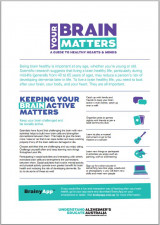
Your brain matters
Alzheimer's Australia, 2017
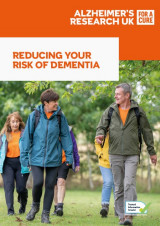
Reducing your risk of dementia
Alzheimer's Research UK, 2023
Credits: Healthify editorial team. Healthify is brought to you by Health Navigator Charitable Trust.
Reviewed by: Dr Emma Dunning, Clinical Editor and Advisor
Last reviewed:





